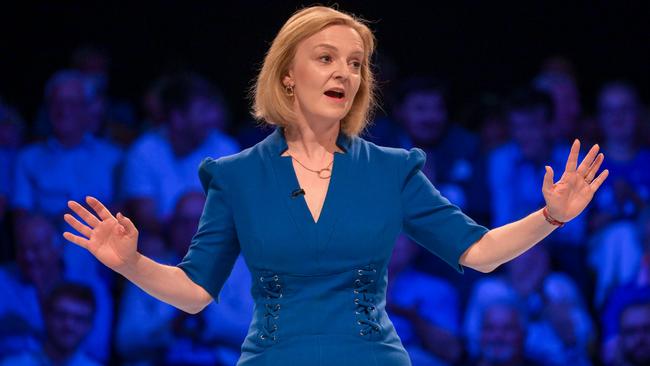UK PM hopeful Liz Truss poll favourite despite sparking anger in Scotland
YouGov finds 60 per cent of Tory party members polled over five days said they would vote for the foreign secretary.

Latest opinion polls show Foreign Minister Liz Truss is ahead in the race to be Britain’s next prime minister, even as she came under fierce fire in Scotland and was forced into a policy U-turn.
As Tory members begin voting for a new party leader by post and online this week, a new survey reveals Ms Truss has extended her lead over her main rival, former chancellor of the exchequer Rishi Sunak.
The YouGov poll for The Times found that 60 per cent of party members surveyed over five days said they would vote for her, against 26 per cent who preferred Mr Sunak. It came after another poll reported by The Times earlier on Tuesday showed her lead had narrowed from more than 20 percentage points to just five – 48 per cent to 43 per cent.
The result of the election, to decide who will replace Prime Minister Boris Johnson, is due on September 5.
Earlier on Tuesday, Ms Truss was accused of insulting the government in Edinburgh after she alleged First Minister Nicola Sturgeon was an “attention seeker” for agitating for Scottish independence, and suggested people should “ignore her”.
The remarks, delivered at a Tory member hustings in southwest England late on Monday, were denounced by the Scottish National Party, which is pressing for a second referendum on independence.
Deputy First Minister John Swinney called the remarks “obnoxious” and contrasted the roughly 200,000 Tory members with the 2.4 million votes the SNP won in elections last year.
“Nicola Sturgeon has far more democratic legitimacy than Liz Truss is going to have if she becomes the prime minister,” he told the BBC.
Mr Sunak has also ruled out another referendum, after Scots voted narrowly in 2014 to stay in the UK. Last week, Mr Sunak called it “the wrong priority at the worst possible moment”. But the SNP argues that Brexit has transformed the constitutional debate, and wants to hold a second plebiscite in October 2023.
The Supreme Court in London plans to hold hearings on October 11-12 into whether that would be legal without approval from the UK government.
Ms Truss outlined the creation of “regional pay boards” outside London for public sector pay, rather than a uniform rate set nationally, as part of a plan to wage “war on Whitehall waste”.
The plan could save £8.8bn ($15.5bn) a year if it covered “all public sector workers in the long term”, her campaign said.
That drew a storm of criticism from Tories in deprived regions of England, noting that all state workers would include nurses, teachers and police officers already suffering from the spiral in inflation. Despite its clear language, a Truss campaign spokesperson alleged on Tuesday the plan had been subject to “wilful misrepresentation”, insisting in an apparent U-turn that there was no plot to slash the pay of any public sector workers.
AFP



To join the conversation, please log in. Don't have an account? Register
Join the conversation, you are commenting as Logout